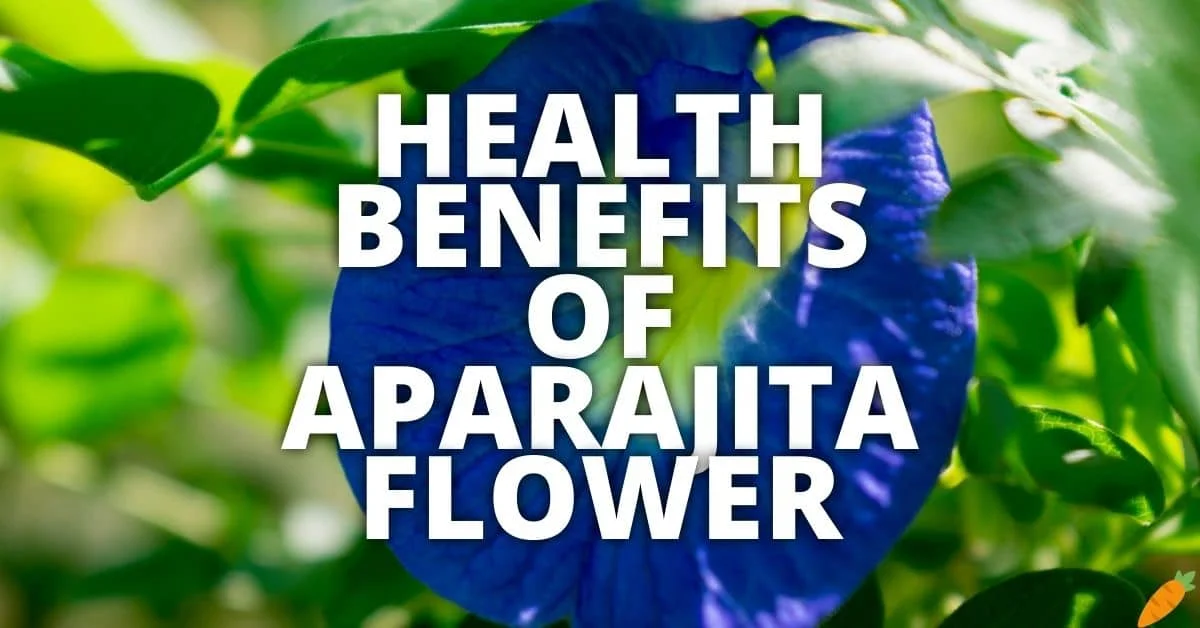It’s an outstanding day to learn about the potential health benefits of Aparajita flower.
🤔 What is the Aparajita flower?
The Aparajita flower, also known as Clitoria ternatea, is a perennial herbaceous plant species in the Fabaceae family.
Originating from tropical regions of Asia, it is also commonly known as butterfly pea or blue pea.
The plant is noted for its vibrant, deep blue flowers, though white and purple varieties also exist.
In traditional Ayurvedic medicine, it is believed to have medicinal properties, including memory enhancement.
It is also popular in culinary uses for its color-changing properties when used in teas and foods.
📝 Here’s a list of the potential health benefits of Aparajita flower.
- Brain Function Improvement
- Stress Reduction
- Protection Against Oxidative Damage
- Inflammation Reduction
- Mood Enhancement
- Vision And Eye Health Support
- Hair Health Promotion
- Skin Health Improvement
- Pain Relief
- Fever Reduction
- Digestive System Support
If you want to learn more, please continue reading.
1. Cognitive Enhancement
The Aparajita flower, often referred to as “butterfly pea,” is traditionally used in Ayurvedic medicine as a nootropic—a substance that can boost cognitive function.
It’s believed that the flower has the ability to enhance memory and learning capabilities, potentially by influencing neurotransmitters in the brain.
Bioactive compounds present in the flower, such as anthocyanins and proanthocyanidins, are thought to be responsible for these effects.
They may protect neurons from damage, promote neuron regeneration, and boost brain function.
However, while there’s some traditional and anecdotal evidence for these cognitive benefits, more comprehensive scientific studies are needed to fully understand and confirm their potential effects.
2. Anti-Stress
The Aparajita flower is known for its potential adaptogenic properties, which means it may help the body resist physical, chemical, or biological stressors.
The flower’s extract is often consumed as a tea and is believed to promote relaxation and alleviate stress symptoms.
It’s thought that certain phytochemicals in the flower, such as flavonoids, might interact with the body’s endocrine system to regulate stress responses and promote balance.
This can potentially reduce feelings of anxiety and promote a sense of calm and well-being.
While there is some traditional and anecdotal evidence supporting these anti-stress effects, it’s important to note that scientific studies still need to further explore and confirm these benefits.
3. Antioxidant Properties
The Aparajita flower possesses substantial antioxidant properties.
These properties are primarily due to the high concentration of phenolic compounds, including flavonoids and anthocyanins, which can neutralize harmful free radicals in the body.
Free radicals are molecules that can cause cell damage and have been associated with aging and various diseases when in excess.
The antioxidant properties of the Aparajita flower may thus help protect against this oxidative stress, potentially reducing the risk of chronic diseases like heart disease and cancer.
However, while there is promising research, more in-depth studies are needed to fully establish these antioxidant benefits for human health.
4. Anti-Inflammatory (My Favorite Potential Health Benefit Of Aparajita Flower)
The Aparajita flower is believed to possess anti-inflammatory properties.
Inflammation is a natural immune response, but chronic inflammation can lead to various health problems.
The flower’s bioactive compounds, particularly flavonoids and anthocyanins, are thought to inhibit certain pathways in the body that trigger inflammation, thus reducing swelling and associated pain.
This potential anti-inflammatory action could be beneficial in managing conditions characterized by chronic inflammation, such as arthritis or inflammatory bowel disease.
However, further scientific research is needed to fully substantiate these traditional and anecdotal claims.
📚 Anti-Inflammatory, Analgesic And Antipyretic Properties Of Clitoria Ternatea Root
5. Antidepressant
The Aparajita flower has been used in traditional medicine for its potential mood-enhancing properties.
Some studies suggest that it may act as a natural antidepressant.
The bioactive compounds in the flower, including flavonoids and other phytochemicals, may influence neurotransmitter activity in the brain, potentially elevating mood and reducing symptoms of depression.
The plant’s calming effects may also help alleviate stress and anxiety, further contributing to its potential antidepressant qualities.
However, more comprehensive scientific research is needed to fully substantiate these potential antidepressant effects.
📙 Italian seasoning may also have antidepressant properties. Learn more about how it can benefit your health on this page.
6. Eye Health
The Aparajita flower has been traditionally used to promote eye health.
It is rich in antioxidants, especially anthocyanins, which are known to support eye health by protecting against oxidative stress.
These antioxidants may help slow the progression of age-related macular degeneration, cataracts, and other vision-related disorders.
Additionally, the flower’s antibacterial properties have been used in folk medicine to help treat eye infections.
Despite these traditional uses, it’s important to note that scientific research is still limited and that more studies are needed to conclusively establish these eye health benefits.
7. Hair Health
The Aparajita flower is commonly incorporated into hair products in India due to its reputed benefits for hair health.
It’s believed that the flower can nourish the hair, promote hair growth, and reduce hair fall, possibly due to its high content of bioflavonoids.
These bioflavonoids may stimulate blood circulation in the scalp, which can enhance the nourishment of hair follicles and promote healthier, stronger hair.
Furthermore, the Aparajita flower is said to impart a blackish-blue tint to the hair, which may be desirable in certain cultures.
However, despite these traditional applications, more scientific studies are needed to fully substantiate these claims about hair health benefits.
8. Skin Health
The Aparajita flower, also known as the butterfly pea, has been traditionally used in skincare due to its potential skin-nourishing and anti-aging benefits.
The flower is rich in antioxidants like anthocyanins and flavonoids, which are believed to protect the skin from oxidative stress and premature aging.
These compounds may help reduce the appearance of wrinkles and improve skin elasticity.
Additionally, its anti-inflammatory properties can potentially help soothe skin irritation and reduce inflammation.
While these benefits are traditionally recognized, it’s important to note that more scientific research is needed to conclusively substantiate these skincare benefits.
9. Analgesic Properties
The Aparajita flower has been traditionally used for its potential analgesic, or pain-relieving, properties.
This is largely attributed to the plant’s bioactive compounds, such as flavonoids, which may inhibit the production of certain enzymes in the body involved in the pain response.
The flower is often used in traditional medicine to alleviate headaches, reduce menstrual pain, and soothe other general body aches.
Its analgesic properties, combined with its anti-inflammatory effects, may also make it effective for conditions like arthritis.
However, it’s important to note that more in-depth scientific research is required to confirm these potential analgesic benefits.
10. Antipyretic Properties
The Aparajita flower has been traditionally used in Ayurvedic and other forms of holistic medicine for its potential antipyretic, or fever-reducing, properties.
The belief is that certain bioactive compounds in the plant may help reduce body temperature during a fever by acting as a natural antipyretic.
It’s thought that these compounds might work by modulating the body’s response to infection or inflammation, thereby helping to manage fever symptoms.
The flower is often consumed as a tea or decoction for this purpose.
However, further scientific research is needed to fully validate these traditional uses.
📙 Nunum may have antipyretic properties as well. On this page, you can learn more about how it can benefit your health.
11. Digestive Health
The Aparajita flower is traditionally used in Ayurvedic medicine to promote digestive health and alleviate various stomach ailments.
It is believed that the plant’s bioactive compounds can stimulate digestion and help maintain the proper functioning of the gastrointestinal tract.
The flower has been used to treat issues such as constipation, stomach ulcers, and indigestion.
Additionally, its potential anti-inflammatory and antioxidant properties may contribute to overall digestive health by reducing inflammation and oxidative stress in the digestive tract.
However, further scientific studies are needed to substantiate these traditional uses.
💡 Conclusion
The Aparajita flower is a remarkable plant with a diverse array of potential health benefits rooted in traditional medicine.
From enhancing cognitive function and alleviating stress to its antioxidant and anti-inflammatory properties, this vibrant blue flower is more than just a pretty face.
Its purported benefits extend to hair and skin health, pain relief, fever reduction, and digestion improvement.
Although these benefits are widely recognized in traditional practices, it’s crucial to note that more scientific research is necessary to conclusively affirm these uses.
So, while we continue to appreciate the Aparajita flower for its captivating beauty, let’s also look forward to future studies illuminating its full health-promoting potential.
😊 My favorite potential health benefit of Aparajita flower is that it may be anti-inflammatory.
It should be helpful in my fight against arthritis.
I’m amazed that there are quite a number of flowering herbs that have this potential health benefit.
However, it’s just a shame that I can’t try them because of their availability here.
What’s your favorite potential health benefit of the Aparajita flower?
I also have posts about other herbs and their potential health benefits that you can check out here.
Please share this article with your family and friends if you think it’s interesting.
I appreciate it!
Be healthy 💪 and stay safe 🦺!
⛑️ Safety First
While the Aparajita flower has many potential health benefits, it’s important to exercise caution.
Those with allergies to the plant, pregnant or breastfeeding women, and individuals with pre-existing medical conditions should avoid using it without medical advice.
Remember, these are potential benefits, some based on anecdotal evidence, and the scientific research may not fully support all claims.
It’s crucial to consult with a healthcare professional before integrating any new natural remedies, like the Aparajita flower, into your health regimen.
Conduct your research, consider both traditional uses and scientific findings, and always seek professional advice to ensure safety and efficacy.
📋 Summary
| Potential Health Benefits Of Aparajita Flower | Details |
| Cognitive Enhancement | Bioactive compounds in the flower, such as anthocyanins and proanthocyanidins, may enhance cognitive function, improving memory and learning. |
| Anti-Stress | Due to their potential adaptogenic properties, the flower’s extracts can help relieve stress and anxiety, promoting a sense of balance and calm. |
| Antioxidant Properties | Strong antioxidant properties provided by high concentrations of phenolic compounds, such as flavonoids and anthocyanins, aid in preventing damage from free radicals. |
| Anti-Inflammatory | Flavonoids and anthocyanins found in the flower may inhibit certain pathways that trigger inflammation, helping reduce inflammation and associated pain. |
| Antidepressant | The flower’s bioactive compounds may influence neurotransmitter activity in the brain, potentially elevating mood and reducing symptoms of depression. |
| Eye Health | Rich in antioxidants, especially anthocyanins, the flower may protect against oxidative stress, potentially slowing the progression of vision-related disorders and treating eye infections. |
| Hair Health | Bioflavonoids in the flower may stimulate blood circulation in the scalp, potentially enhancing the nourishment of hair follicles and promoting healthier, stronger hair. |
| Skin Health | The flower’s antioxidants and anti-inflammatory properties may protect the skin from oxidative stress, reduce inflammation, improve skin elasticity, and slow the signs of aging. |
| Analgesic Properties | The flower’s bioactive compounds, particularly flavonoids, may inhibit the production of certain enzymes in the body involved in the pain response, potentially providing natural pain relief. |
| Antipyretic Properties | Certain bioactive compounds in the plant may help reduce body temperature during a fever by acting as a natural antipyretic. |
| Digestive Health | Compounds in the flower can stimulate digestion, maintain the proper functioning of the gastrointestinal tract, and help treat issues like constipation and indigestion. |

